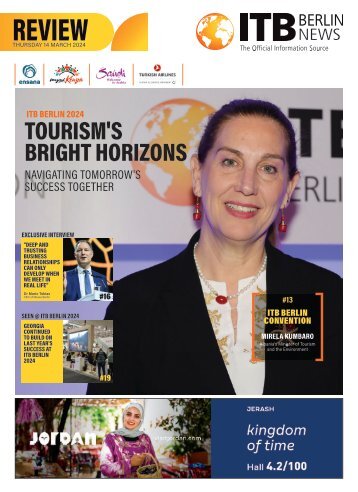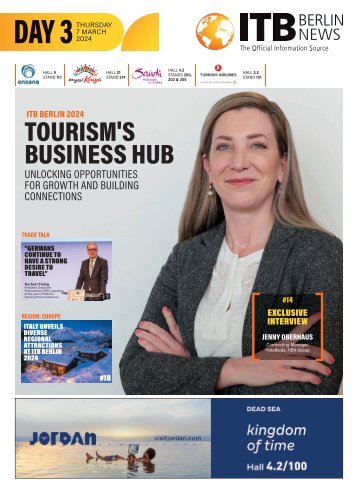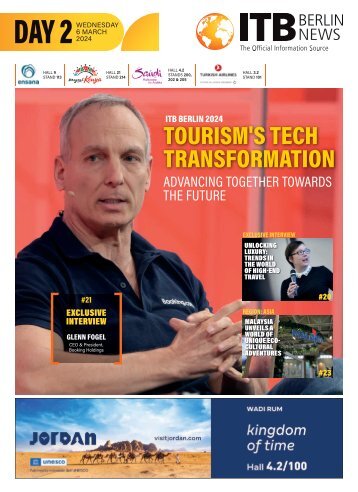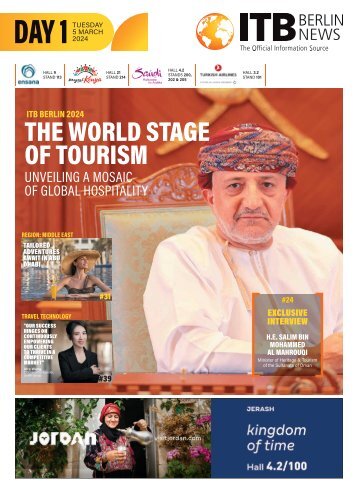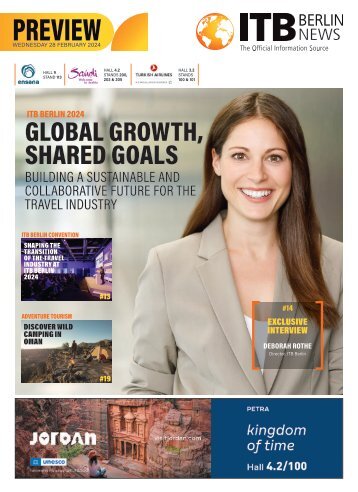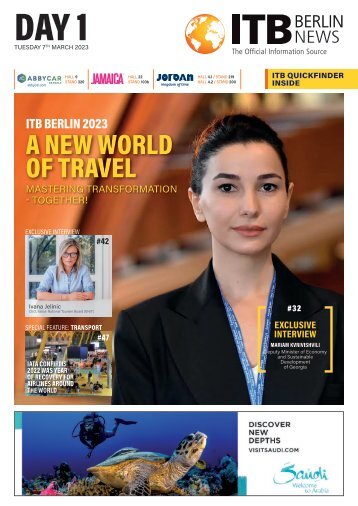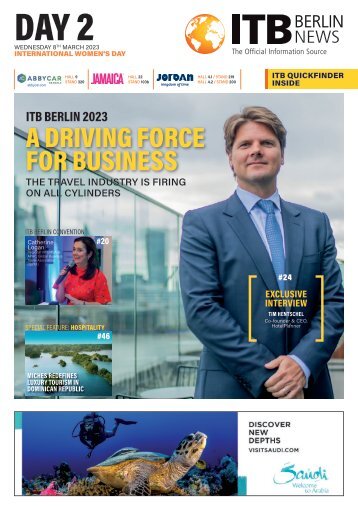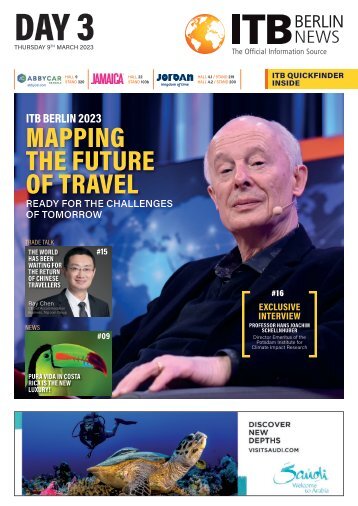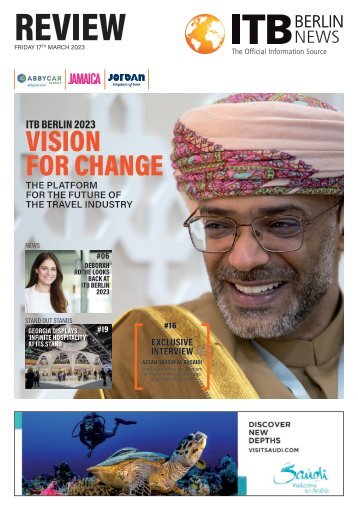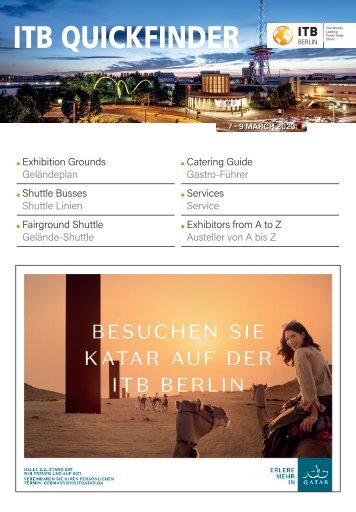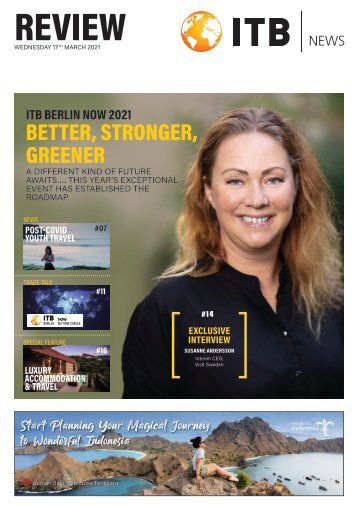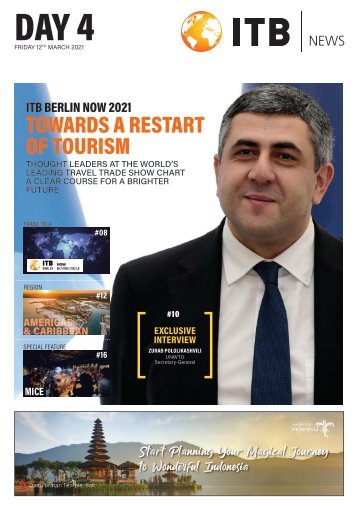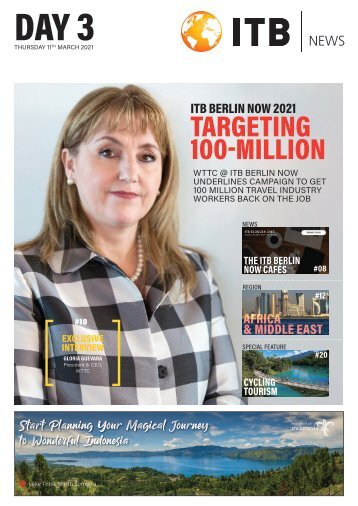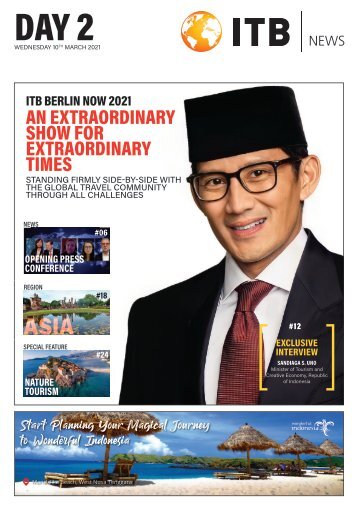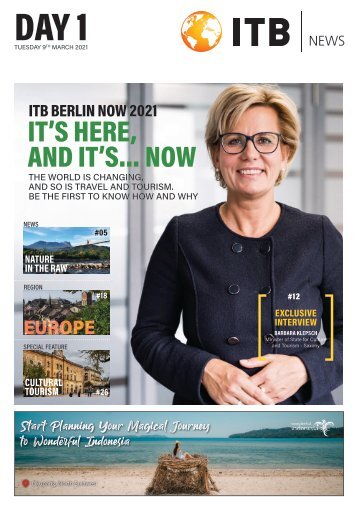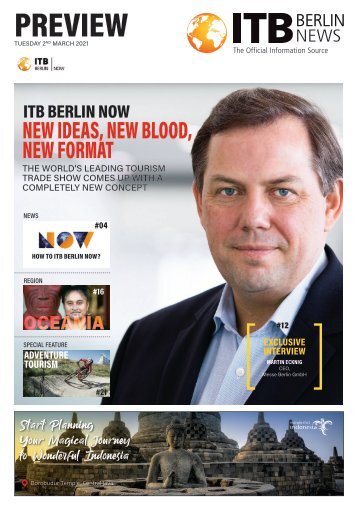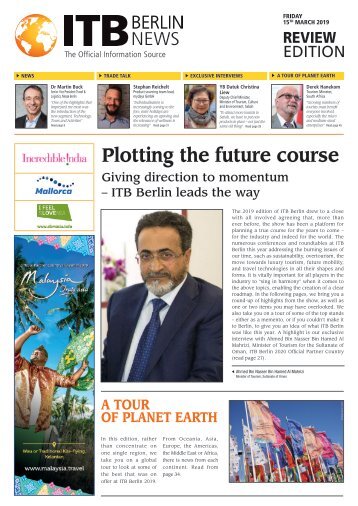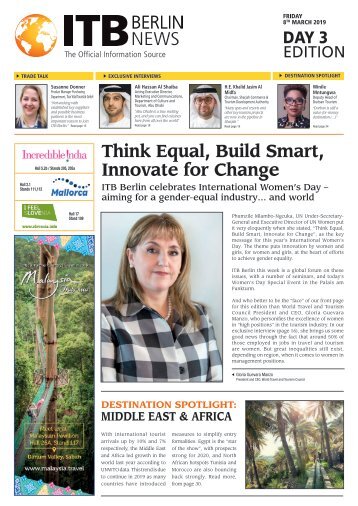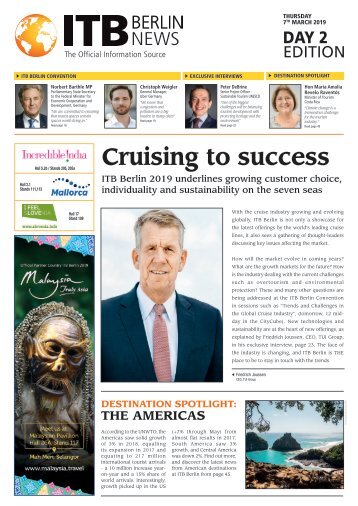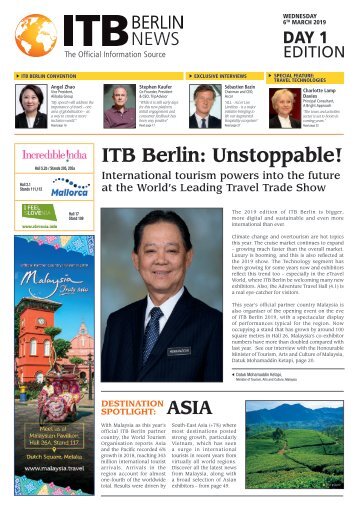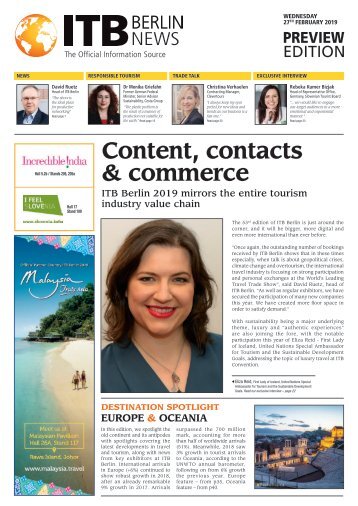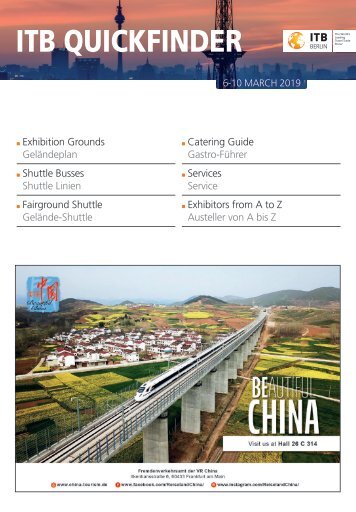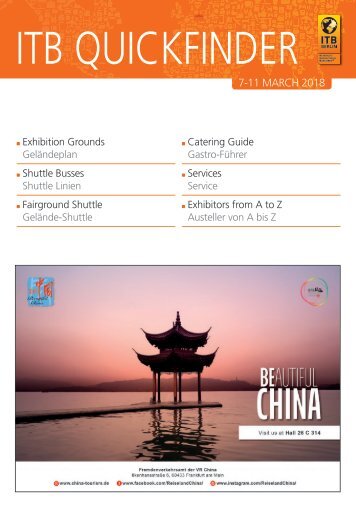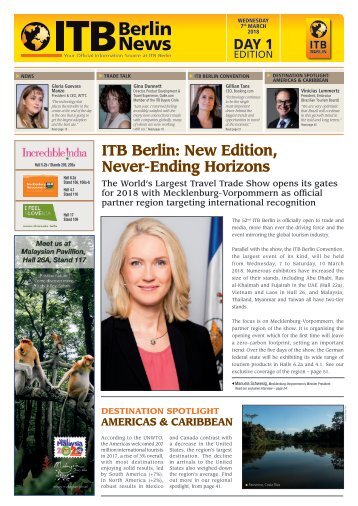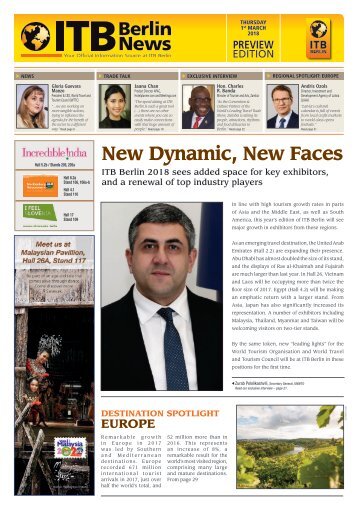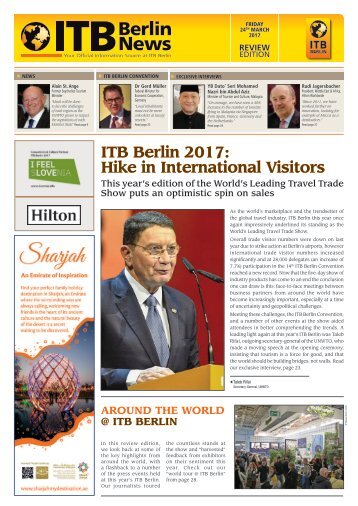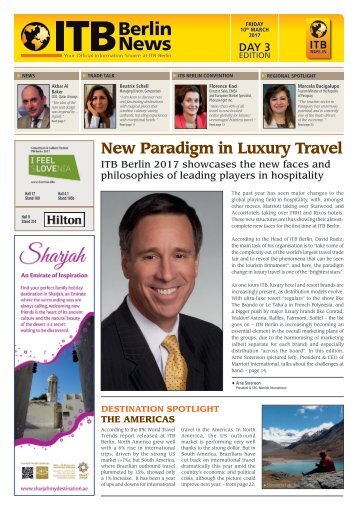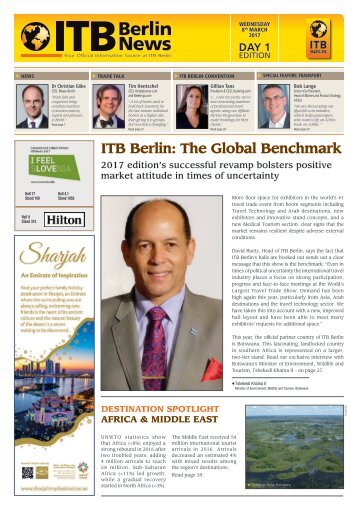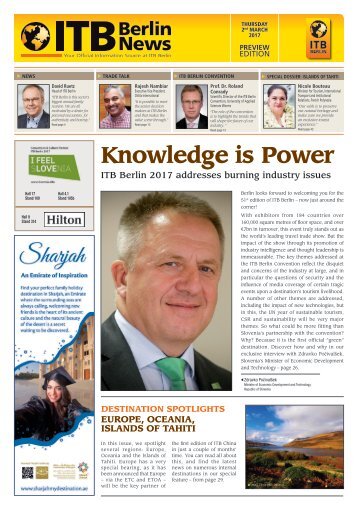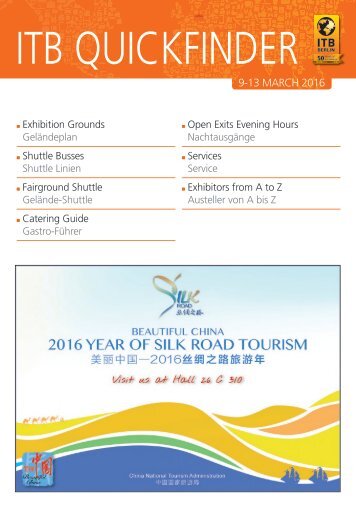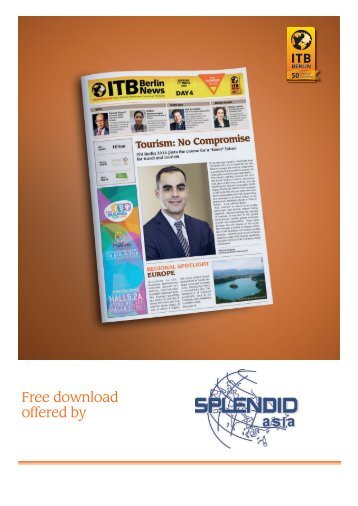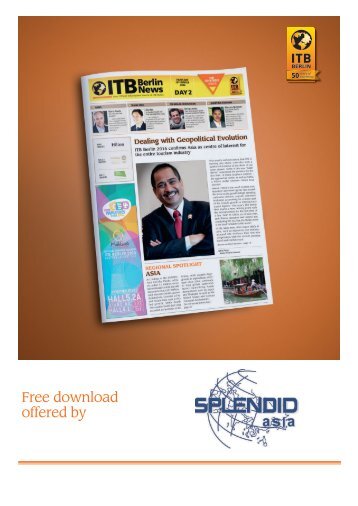
ITB Berlin News - Review Edition
- Text
- Berlin
- Tourism
- Global
- Unwto
- Sustainable
- Airlines
- Destinations
- Germany
- Travellers
- Hotels
6 NEWS The Year That Was
6 NEWS The Year That Was – And The Year To Come Highlights of IPK International’s presentation at ITB Berlin 2017 Berlin, March 8, 2017 DESPITE TERROR AND UNREST, TOURISM CONTINUED TO GROW Political unrest and terror attacks yet again dominated the headlines in a number of important destination countries in the last year, such as Turkey and France, which at times led to travellers staying away in droves. However, this did not result in a breakdown in global travel as people around the world kept traveling more than ever before in 2016. Worldwide, the number of outbound trips has increased by 4%, reaching nearly 1.1 billion international trips according to the latest results of IPK’s World Travel Monitor, an annual survey analysing the outbound travel behaviour in more than 60 countries worldwide, which covers more than 90% of the global outbound demand. ASIA DRIVES GLOBAL OUTBOUND GROWTH WHILE SPAIN TAKES THE LEAD IN DESTINATIONS Asia remains the number one source market region for growth in international travel with an overall increase of 9% compared to the previous year, followed by South America with 5%. Outbound trips from North America and Europe both grew by 3%. In absolute terms however, Europe prevails as the number one source market with more than half of the outbound travel volume worldwide. Yet when it comes to inbound tourism, Spain outperformed the US as the number one travel destination in 2016 while Germany is still on third place. Italy and France follow on fourth and fifth place. CITY TRIPS ARE THE FASTEST GROWING HOLIDAY MARKET SEGMENT While Sun & Beach holidays are still the number one holiday type with a market share of 28% of all outbound holidays, city trips have been catching up over the past five years and have now reached a share of 26% in 2016. “Although cities have been impacted by some terror attacks, city trips still are a real boom business all around the world”, explained Rolf Freitag, CEO of IPK International, during his presentation on the occasion of ITB Berlin’s Future Day 2017. After Sun & Beach Holidays and City Trips, Touring follows third with a steady market share of 19%. TRAVEL BEHAVIOUR STILL INFLUENCED BY TERROR FEAR For the third time, IPK International conducted a special survey on this topic in 21 main source markets worldwide in February 2017. The study revealed that for 45% of international travellers the recent instability and terror warnings will have an influence on their travel plans for 2017. This is a 6-percentage point’s increase compared to February 2016. However, the survey exhibits regional differences between source markets in Europe, Asia, North and South America. Regarding the question what kind of influence the current situation could have on the travel behaviour, 16% of international travellers indicated that they will not travel abroad in 2017 or will only go on domestic trips within their own country. A further 29% stated that they will still be traveling abroad, yet only to destinations they perceive as “safe”. For some destinations, the situation regarding safety has even deteriorated compared to the previous year. For example, while in February last year 64% of the respondents perceived Turkey as “unsafe”, in February 2017 this figure has further accelerated to 76%. Hence, shifts from “unsafe” to “safe” destinations will further continue in 2017. OUTLOOK 2017 Although the threat of terror prevails, IPK International anticipates global outbound trips to increase by robust 4% in 2017. According to IPK International’s Outbound Travel Forecast for 2017, Asian outbound travel is once again expected to be the main growth driver with an increase of 5%, but also North America (+5%) can expect a strong outbound travel year, while international travel of Europeans and South Americans is expected to continuously show a moderate growth (both +3%) ITB BERLIN NEWS • Friday 24 th March 2017 www.itb-berlin-news.com
NEWS 7 Phocuswright @ ITB Berlin European Travelers Cutting Back on Transportation Costs Travel plays a significant role in European culture and more adults are packing their bags than ever before. However, in the face of a weakening currency, many European travellers are cutting back where they can and choosing cost-conscious means of getting to their destination. “With travellers spending less on leisure trips, air and rail transportation took a hit in France, Germany, and the UK,” says Phocuswright’s research analyst, Brandie Wright. “Less air and rail means more drive trips. In France, which had the biggest jump in budget travellers, nearly two thirds of travellers who didn’t book airfare ended up driving to their last destination.” In a marketplace of mixed signals, intentions for transportation purchases in the coming year remain modest. Intentions for car travel is decreasing in France, where one in five travellers plan to travel more by rail. On the other hand, Germany is likely to continue seeing more leisure trips close to home, as travellers have much stronger intentions for increasing road travel than air or rail trips. Complex trips that involve both lodging and air purchases have historically been high among British travellers, and intentions – albeit pre-Brexit – are even more optimistic for next year. Travel indeed plays a significant role in European culture. Even in the face of a weakening currency, consumers are relentless with their travel plans and more adults are packing their bags than ever before. Travelers are cutting back where they can, meaning fewer trips and packaged holidays. However, they are holding out for long, international excursions to new destinations. Together, France, Germany and the UK comprise approximately 60 % of the total European travel market, or €158 billion in gross bookings in 2015. CHINESE AIRLINES GET SERIOUS ABOUT DIRECT BOOKINGS The Chinese government’s early-2016 directive, calling for China’s stateowned airlines to sell at least half of all tickets directly by 2018 and avoid online travel agency (OTA) commissions, pressured airlines to get much more aggressive about selling online. And they have a long way to go. In 2015, just 16% of overall bookings went through airlines’ websites. Airline call centers account for a low-single-digit share, meaning that just over one-fifth of bookings come through combined direct channels. China’s airlines have been cutting commissions for years, and now only the biggest agents receive them. But even in a segment dominated by three airlines, distribution partners continue to play a key role. Airlines need better tech to pursue state-mandated direct booking targets, while OTAs want to ensure access to content. Several OTAs formed alliances with airlines in the form of major investments. “China’s airlines lag far behind OTAs in the technology department,” says Phocuswright’s senior research analyst, Maggie Rauch. “But after treating web- and then mobile-based distribution as an afterthought, these state-owned behemoths have begun to take digital distribution seriously. They’re growing their in-house mobile teams, and optimization of user experience and marketing are now strategic priorities.” Loyalty programmes are getting more attention, too. Members enjoy easier reservation changes, and access to private sales. China’s big three airlines expanded their loyalty partnerships to include more airlines, as well as other travel suppliers. Airlines’ focus on digital distribution, reining in intermediaries and loyalty programmes will push direct bookings to 60% by 2020 ITB BERLIN NEWS • Friday 24 th March 2017
- Page 1: FRIDAY 24 TH MARCH 2017 REVIEW EDIT
- Page 4 and 5: 4 NEWS © Messe Berlin GmbH ITB Ber
- Page 8 and 9: 8 NEWS 6 th UNWTO Silk Road Tour Op
- Page 10 and 11: 10 NEWS (L-R): Neil Glenn, General
- Page 12 and 13: 12 NEWS Marriott: New Roadmap Annou
- Page 15 and 16: NEWS 15 Best Medical Tourism Destin
- Page 17: NEWS 17 Tom Alderink Director LGBT
- Page 20 and 21: 20 TRADE TALK Better People, Better
- Page 22 and 23: 22 ITB BERLIN CONVENTION Minister M
- Page 24 and 25: 24 EXCLUSIVE INTERVIEW YB Dato’ S
- Page 26 and 27: 26 EXCLUSIVE INTERVIEW 5 Pillars to
- Page 28 and 29: 28 AROUND THE WORLD @ ITB BERLIN Sl
- Page 30 and 31: 30 AROUND THE WORLD @ ITB BERLIN Ky
- Page 32 and 33: 32 AROUND THE WORLD @ ITB BERLIN In
- Page 34 and 35: 34 SPOTLIGHT ON GERMAN REGIONS Metz
- Page 36: 36 WHERE TO GO IN Berlin Cultural E
Inappropriate
Loading...
Mail this publication
Loading...
Embed
Loading...
